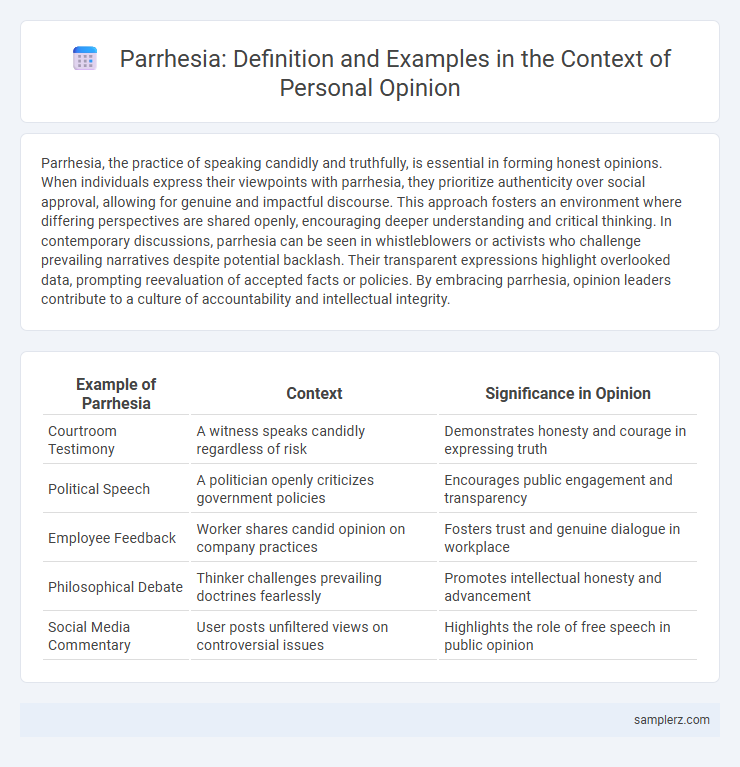Parrhesia, the practice of speaking candidly and truthfully, is essential in forming honest opinions. When individuals express their viewpoints with parrhesia, they prioritize authenticity over social approval, allowing for genuine and impactful discourse. This approach fosters an environment where differing perspectives are shared openly, encouraging deeper understanding and critical thinking. In contemporary discussions, parrhesia can be seen in whistleblowers or activists who challenge prevailing narratives despite potential backlash. Their transparent expressions highlight overlooked data, prompting reevaluation of accepted facts or policies. By embracing parrhesia, opinion leaders contribute to a culture of accountability and intellectual integrity.
Table of Comparison
| Example of Parrhesia | Context | Significance in Opinion |
|---|---|---|
| Courtroom Testimony | A witness speaks candidly regardless of risk | Demonstrates honesty and courage in expressing truth |
| Political Speech | A politician openly criticizes government policies | Encourages public engagement and transparency |
| Employee Feedback | Worker shares candid opinion on company practices | Fosters trust and genuine dialogue in workplace |
| Philosophical Debate | Thinker challenges prevailing doctrines fearlessly | Promotes intellectual honesty and advancement |
| Social Media Commentary | User posts unfiltered views on controversial issues | Highlights the role of free speech in public opinion |
Defining Parrhēsia: The Essence of Fearless Speech
Parrhesia embodies the essence of fearless speech by allowing individuals to express honest opinions without restraint or fear of repercussions. This practice fosters open dialogue and challenges power structures through candid truth-telling. Genuine parrhesia requires courage and integrity, emphasizing the importance of speaking boldly despite potential consequences.
Parrhēsia in Historical Context: Ancient Voices of Dissent
Parrhesia in historical context embodies the courageous tradition of speaking truth to power, as exemplified by Socrates' fearless critiques of Athenian democracy and Diogenes' bold confrontations with societal norms. This ancient form of candid expression served as a vital mechanism for dissent, enabling philosophers and citizens alike to challenge authority without fear of retribution. The legacy of parrhesia underscores the enduring importance of fearless speech in fostering democratic discourse and accountability.
Modern Examples of Parrhēsia in Opinion Journalism
Modern examples of parrhesia in opinion journalism include whistleblowers and investigative reporters who candidly expose government corruption or corporate wrongdoing despite potential backlash. Journalists like Glenn Greenwald, who revealed classified information from Edward Snowden, embody parrhesia by speaking truth to power regardless of personal risk. This fearless expression fosters transparency and accountability, vital for democratic societies.
Social Media and the Revival of Parrhēsia
Social media platforms have become modern arenas for parrhesia, where individuals openly express bold and truthful opinions despite potential backlash. This revival of frank speech empowers marginalized voices and fosters a culture of transparency and critical dialogue. The dynamic interaction on social media challenges traditional power structures, exemplifying how parrhesia reshapes contemporary discourse.
The Role of Parrhēsia in Shaping Public Discourse
Parrhesia, the courageous act of speaking truth to power, plays a crucial role in shaping public discourse by fostering transparency and accountability in democratic societies. When individuals exercise parrhesia, they challenge dominant narratives and encourage open debate, which promotes a more informed and engaged citizenry. This fearless expression of honest opinion helps to prevent the manipulation of public opinion and supports the development of policies that reflect the genuine interests of the community.
Risks and Rewards: Consequences of Practicing Parrhēsia
Practicing parrhesia involves significant risks such as social ostracism, professional setbacks, or even legal repercussions, especially in authoritarian contexts where candid expression challenges power. However, the rewards include fostering transparency, encouraging ethical accountability, and promoting societal progress by enabling honest dialogue and critical reflection. Balancing these consequences requires courage and strategic consideration, as the impact of parrhesia extends beyond the individual to influence collective truth and justice.
Parrhēsia versus Censorship: Navigating Opposing Forces
Parrhesia embodies fearless truth-telling that challenges authority and societal norms, opposing the restricting grip of censorship that aims to silence dissenting voices. This dynamic tension highlights the essential role of parrhesia in fostering democratic dialogue and preserving freedom of expression. Understanding this conflict is crucial for defending open discourse against mechanisms that suppress critical opinions.
Parrhēsia in Political Opinions: Speaking Truth to Power
Parrhesia in political opinions manifests as fearless truth-telling by citizens or politicians, challenging authority despite potential risks. This candid expression disrupts power dynamics by exposing corruption, injustice, or policy failures, fostering accountability and democratic engagement. Historical examples include whistleblowers and activists who embody parrhesia by confronting dominant narratives to provoke political reform.
Ethical Considerations: Responsibility in Parrhēsiastic Expression
Parrhesia exemplifies the ethical responsibility of speaking truth candidly while respecting the potential impact on others. This form of fearless expression requires balancing honesty with humility to avoid harm and maintain trust. Ethical parrhesia demands accountability for one's words, ensuring that truth is conveyed with integrity and social awareness.
Cultivating a Culture of Parrhēsia in Contemporary Society
Cultivating a culture of parrhesia in contemporary society empowers individuals to speak truthfully and courageously, fostering transparency and accountability in public discourse. Encouraging open dialogue without fear of retribution enhances democratic participation and strengthens social trust. Emphasizing the value of fearless speech nurtures environments where diverse perspectives contribute to collective progress and ethical governance.

example of parrhēsia in opinion Infographic
 samplerz.com
samplerz.com